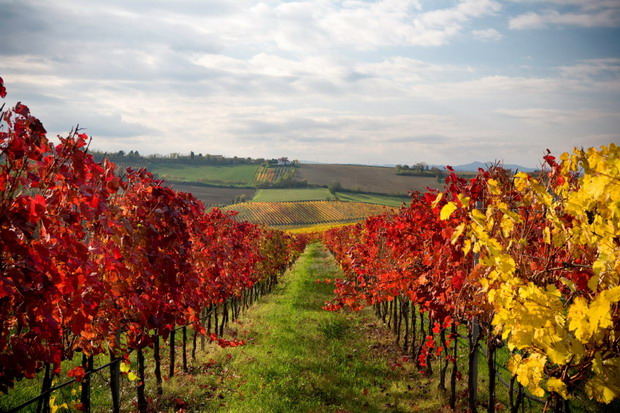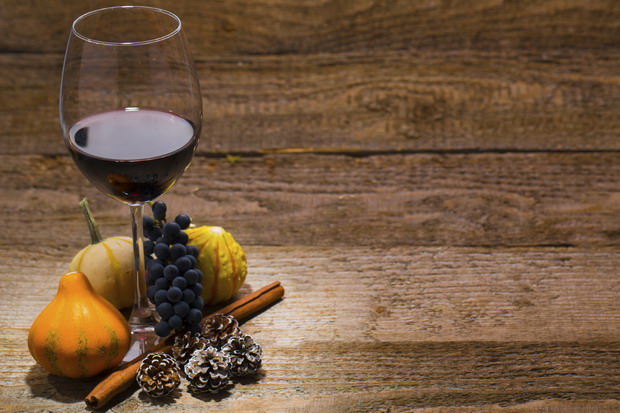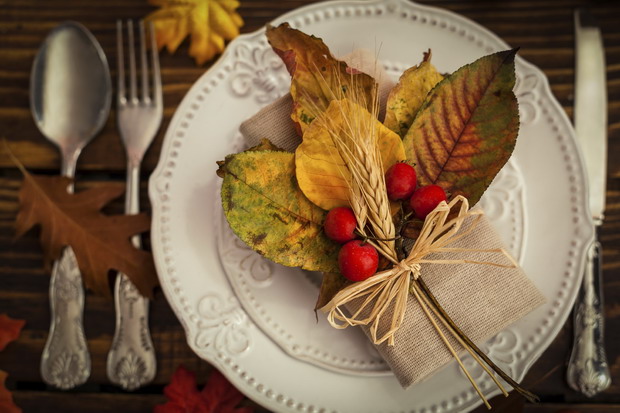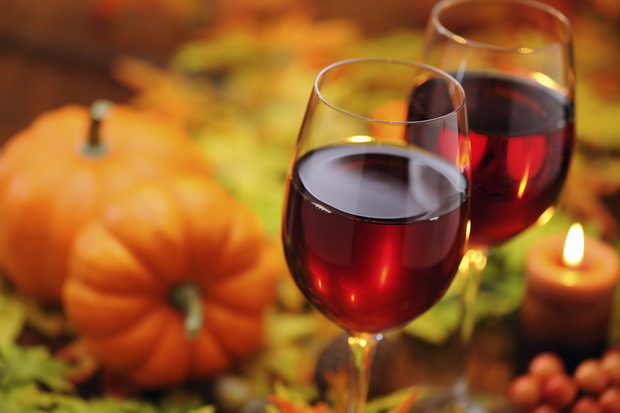In the video above, we discuss the best wines of fall food pairings from around the world on the Business News Network (BNN).
You don’t have to pay a lot to get great value in your glass these days. Click on the arrow above to play the video and find out which wines over-deliver on their price point.
Pamela: As the season changes your wine list should change too. We could all use some tips on picking a good bottle of wine, with great value. I caught up with Natalie MacLean who is a wine writer and also author of “Unquenchable: a Tipsy Search for the World’s Best Bargain Wines” for her thoughts on some of the best wine values. As the days grow shorter, you can watch this.
Natalie: If we think of Canadian wine, we think of Niagara first, Okanagan second, and that’s kind of where most people’s perception stops. We sometimes also think of the hangover from the 1970s or 1980s when we had grim wines.
But so much has changed, the quality, the knowledge of the soils and the grapes, the wine making techniques. I mean it’s just spectacular what’s happening now and the price quality ratio is there as well. They compete head to head with wines from other regions around the world.
Pamela: Talk a little bit about the different, I guess, techniques in farming. I mean some people want organic wines, some people follow the moon and when they should pick the grapes. How are some of these developed over the last little while in Canada?
Natalie: In Canada they are among the fastest growing techniques. So you mentioned organic and the stars and the moon, that’s taking organic to another level; biodynamic. We have vineyards like Southbrook Vineyards, here in Ontario, and many in Okanagan that are practicing these as a way of taking better care of the vines.
Southbrook Triomphe Chardonnay
Niagara Peninsula, Ontario V.Q.A., Canada
So of course there’s the environmental advantage; there isn’t a difference in terms of taste and it’s certainly not a health benefit to drink organic wines. But to practice organically in a cool climate like ours is tough because we are battling mildew and rains and pests than say a warmer climate like Chile or Argentina just doesn’t have to deal with. So it takes a lot more care of those vines, and that usually ends up as translating to better quality wines.
Pamela: Let’s talk about some of the regions a little bit. When we think of BC wines, what type of wines are we talking about? What grapes, what Meritage are those?
Natalie: Right. So, BC, even though it’s technically a cool climate, it does tend to have warmer days. So it ripens those big reds; they need a lot of warmth, a lot of sunshine, a lot of hang time on the vines. That’s what creates flavour in the grapes and translates into the wines. So you are going to find them to be very successful with Sarong, Cabernet Sauvignon and so on.
That said the Okanagan is a fair sized region. So, you also have your Pinot Noirs, your Rieslings, and as a result of the cooler climate, more zesty and more acidity that those cool nights provide. That’s the balance that you’re looking for, but the Okanagan has a spectacular range of styles.
Pamela: And I wanted to ask a little bit about regions around the world. We often think of France, and of course France is made up of a variety of regions as well; as well as Italy, if you were looking for the best deal from a region around the world, that maybe most of us wouldn’t have heard of.
What is priced best, taste the most delicious, maybe from somewhere we don’t know, or do know?
Natalie: I think South America still offers really substantial value and so what we might not know, we might be familiar with the wines of Chile and Argentina. But, we might not be as familiar with the grapes that they produce that have that terrific price quality ratio.
Like in Argentina, you’ve got Torrontés, that’s the name of the grape, and it’s a very floral, white, delicate wine. Those wines are priced around thirteen dollars, and they taste twice as expensive as they cost; they’re beautiful. In Argentina, you’ve got Malbec, Bonarda, some very different grapes.
And you know, the best way to discover these kind of wine is if you like this, than you’ll like that. If you like Cabernet, you might like Malbec. If you like Merlot you might like Bonarda, and it’s a good way to kind of discover new regions, but also more importantly new styles and grapes of wine.
Pamela: Great, hey you have a couple here that we might take a look at.
Natalie: Absolutely. So if we do start in South America, I’ve got Pinot Grigio, one of the fastest growing white wines in the liquor store because it’s light, it’s white, it’s zesty, it goes with the types of foods we eat these days. So we’re less meat, more vegetarian, more crisp, and light. So, this is a terrific one from Graffigna.
Graffigna Centenario Reserve Pinot Grigio
San Juan, Argentina
The four wines that I have here are all thirteen dollars or less, because I’m always looking for that kind of value.
So if we go back to Niagara, here we’ve got a Pinot Noir from Inniskillin. Beautiful wine, fourteen dollars. They call it the heart break grape, because it’s usually very expensive to make. But they’ve produced a great value on this.
Inniskillin Pinot Noir
Niagara-on-the-Lake, Ontario V.Q.A., Canada
It is great for turkey, which is right around the corner; a couple turkey dinners coming up. But it’s also very food friendly wine, it packs flavor but it’s not heavy. So it’s a great one too.
If you want to splurge, sort of again thinking way ahead I guess to the holidays, this is a thirty dollar wine from Jackson-Triggs, Niagara. It’s a Cabernet Merlot blend, it’s got heft, it’s beautiful. And they’re emphasizing the soils, that’s what makes wine.
Jackson-Triggs Delaine Vineyard Cabernet Merlot
Niagara Peninsula, Ontario V.Q.A, Canada
Wine’s calling card is where it’s grown and its soils; this is thirty dollars. So that’s your splurge wine.
Now we get to Chile Errazuriz. It’s a mouthful to say but it’s great to drink. It’s Merlot…
Errazuriz Estate Merlot
Curico Valley, Chile
Pamela: It probably gets easier to say as we go.
Natalie: It does, especially as you have more of it, yes.
Pamela: Yeah.
Natalie: Yes. Merlot, they also have Carménère, that’s another lesser known grape. It’s not as well known. It originally comes from Bordeaux and it is the parent, the related grape to Merlot.So this is thirteen dollars; terrific value.
Errázuriz Aconcagua Alto Carmenère
Aconcagua Alto, Chile
And lastly, another floral white from Niagara. Blends are big now; Riesling Gewürtzraminer blend. There’s Chardonnay in here, open, and it’s thirteen bucks too, so you can’t go wrong with that.
Open Riesling Gewürztraminer
Niagara Peninsula, Ontario V.Q.A.
Pamela: Fantastic, that’s my favorite. Natalie thank you so much, appreciate your time.
Natalie: Thank you Pam. Alright.
Pamela: So that was my conversation with Natalie MacLean, she’s a wine writer. She’s also the author of “Unquenchable: a Tipsy Search for the World’s Best Bargain Wines”.
You can find information on all those wines that she mentioned during the interview that’s on our website and you also can take a look at the exclusive content we’ve put up there where Natalie shares her top five tips on how to read a wine label.
Often you can go into stores and feel somewhat overwhelmed by the choices. She gives you a few quick tips to see if there’s good stuff on the label that can help you out.
We also opened a very nice full-body Merlot for a taste.
 Posted with permission of the Business News Network.
Posted with permission of the Business News Network.


















